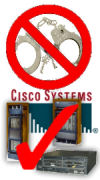 Well, close, but not exactly. The fine arose from export of bubonic plague toxins to Tanzania where, like coal in Newcastle, bubonic plague (both in the wild and in the laboratory) is plentiful.
Well, close, but not exactly. The fine arose from export of bubonic plague toxins to Tanzania where, like coal in Newcastle, bubonic plague (both in the wild and in the laboratory) is plentiful.
In the September 14 Federal Register, the BIS announced that it had reached a settlement with Dr. Thomas Butler relating to BIS charges that Dr. Butler had exported vials of bubonic plague to Tanzania without a license. Under the settlement agreement Dr. Butler agreed to pay $34,700 in penalties. Additionally he consented to losing his export privileges for 10 years.
This represents what is probably the final chapter in the Dr. Butler’s saga with the Federal Government which began in January 2003, when he reported that vials of bubonic plague that had been in his research laboratory at Texas Tech University had gone missing. Although the fate of those vials was never determined, Dr. Butler was charged with a number of unrelated offenses arising out of the investigation of the missing vials. In December 2003, the jury dismissed most of the criminal charges against Dr. Butler; it did, however, uphold a criminal export violation charge arising out of the shipment of vials of bubonic plague to Tanzania.
Dr. Butler was sentenced to 2 years in jail on the export violation charge, a sentence which he completed after 19 months in November 2005. In addition, Dr. Butler lost his medical license and his tenured teaching position at Texas Tech. That, however, wasn’t apparently enough in the view of BIS, which piled on the additional civil penalties after Dr. Butler was released from jail.
At the sentencing hearing on the criminal charge, Dr. Butler stated that the vials that he shipped to Tanzania belonged to the Government of Tanzania which had released them to him on condition that they be returned. Additionally, there was expert testimony — reasonable in my view — that BIS would have routinely granted a license to export the vials of bubonic plague to Tanzania given the widespread availability in Tanzania of isolated strains of bubonic plague. Neither of these are, of course, a defense, but they both raise the question of why BIS would continue to pursue the matter after a 2-year prison term had already been imposed by the court.
The Federal Government’s treatment of Dr. Butler has been widely criticized by the scientific community which has argued that the harsh treatment accorded to him would deter other scientists and physicians from engaging in research to provide treatments for germs that could be used as agents of biological warfare. See the complete chronology of Dr. Butler’s case as maintained here by the federation of American Scientists. The Cleveland Plain Dealer also published an excellent and informative 7-part series on Dr. Butler.

 Posted by
Posted by  Category:
Category: 

 An excellent
An excellent  In today’s Federal Register, OFAC
In today’s Federal Register, OFAC  In December 2005, a plenary conference of the
In December 2005, a plenary conference of the  Right before the Labor Day Holiday, BIS issued
Right before the Labor Day Holiday, BIS issued 

